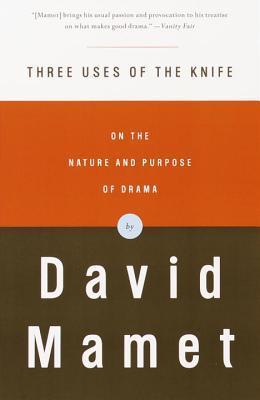
The purpose of theater, like magic like religion… is to inspire cleansing awe. With bracing directness and aphoristic authority, one of our greatest living playwrights addresses the questions: What makes good drama? And why does drama matter in an age that is awash in information and entertainment? David Mamet believes that the tendency to dramatize is essential to human nature, that we create drama out of everything from today’s weather to next year’s elections. But the highest expression of this drive remains the theater. With a cultural range that encompasses Shakespeare, Bretcht, and Ibsen, Death of a Salesman and Bad Day at Black Rock, Mamet shows us how to distinguish true drama from its false variants. He considers the impossibly difficult progression between one act and the next and the mysterious function of the soliloquy. The result, in Three Uses of the Knife, is an electrifying treatise on the playwright’s art that is also a strikingly original work of moral and aesthetic philosophy.
Author
David Alan Mamet is an American author, essayist, playwright, screenwriter and film director. His works are known for their clever, terse, sometimes vulgar dialogue and arcane stylized phrasing, as well as for his exploration of masculinity. As a playwright, he received Tony nominations for Glengarry Glen Ross (1984) and Speed-the-Plow (1988). As a screenwriter, he received Oscar nominations for The Verdict (1982) and Wag the Dog (1997). Mamet's recent books include The Old Religion (1997), a novel about the lynching of Leo Frank; Five Cities of Refuge: Weekly Reflections on Genesis, Exodus, Leviticus, Numbers and Deuteronomy (2004), a Torah commentary, with Rabbi Lawrence Kushner; The Wicked Son (2006), a study of Jewish self-hatred and antisemitism; and Bambi vs. Godzilla, an acerbic commentary on the movie business.